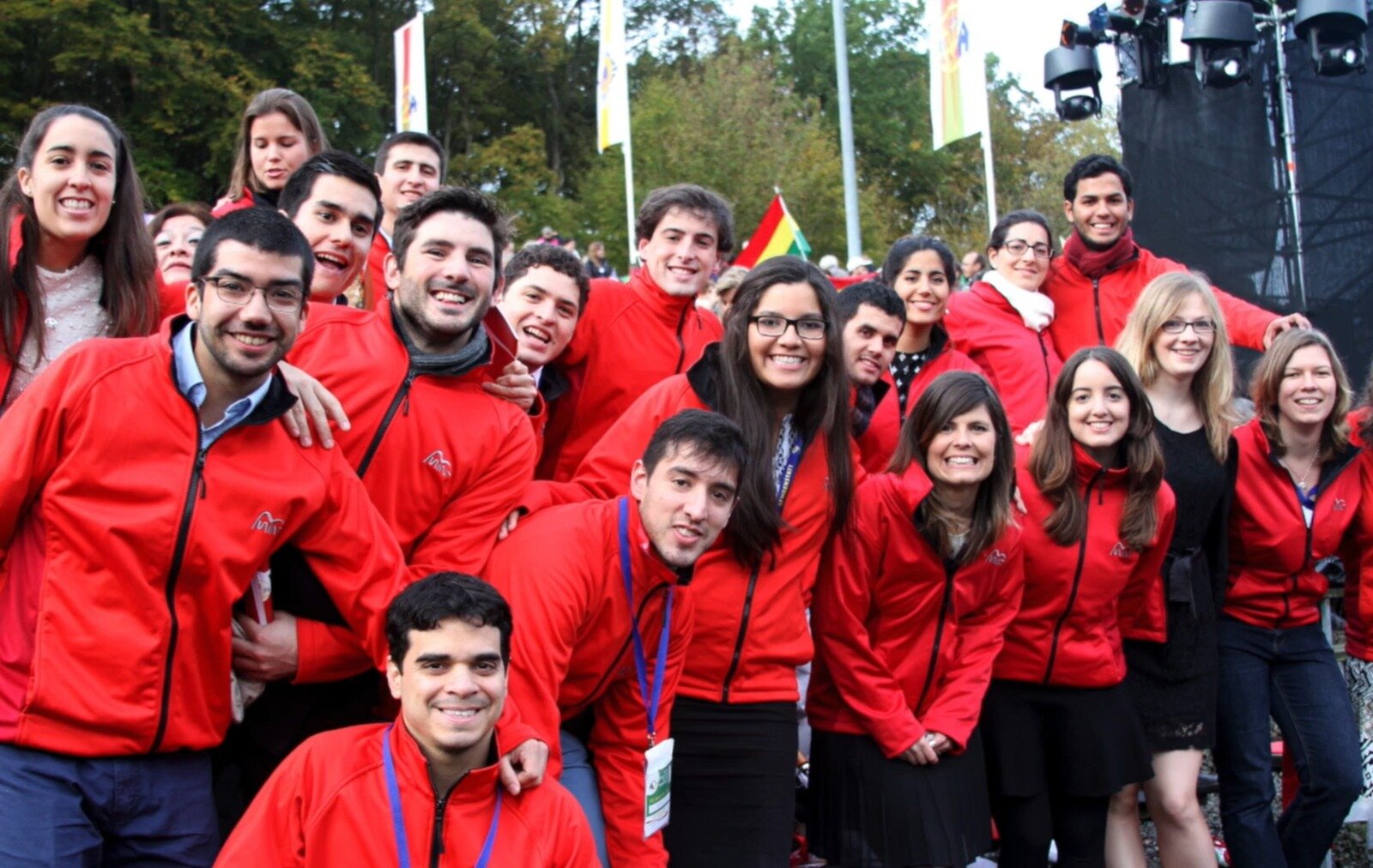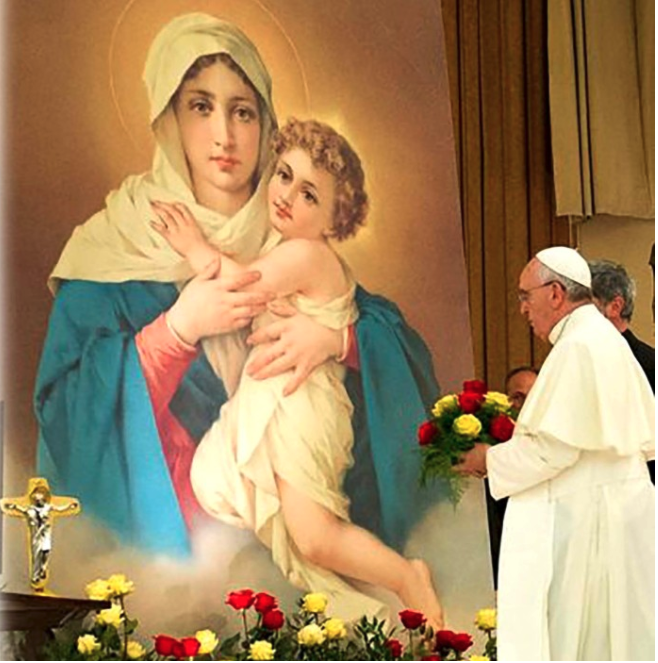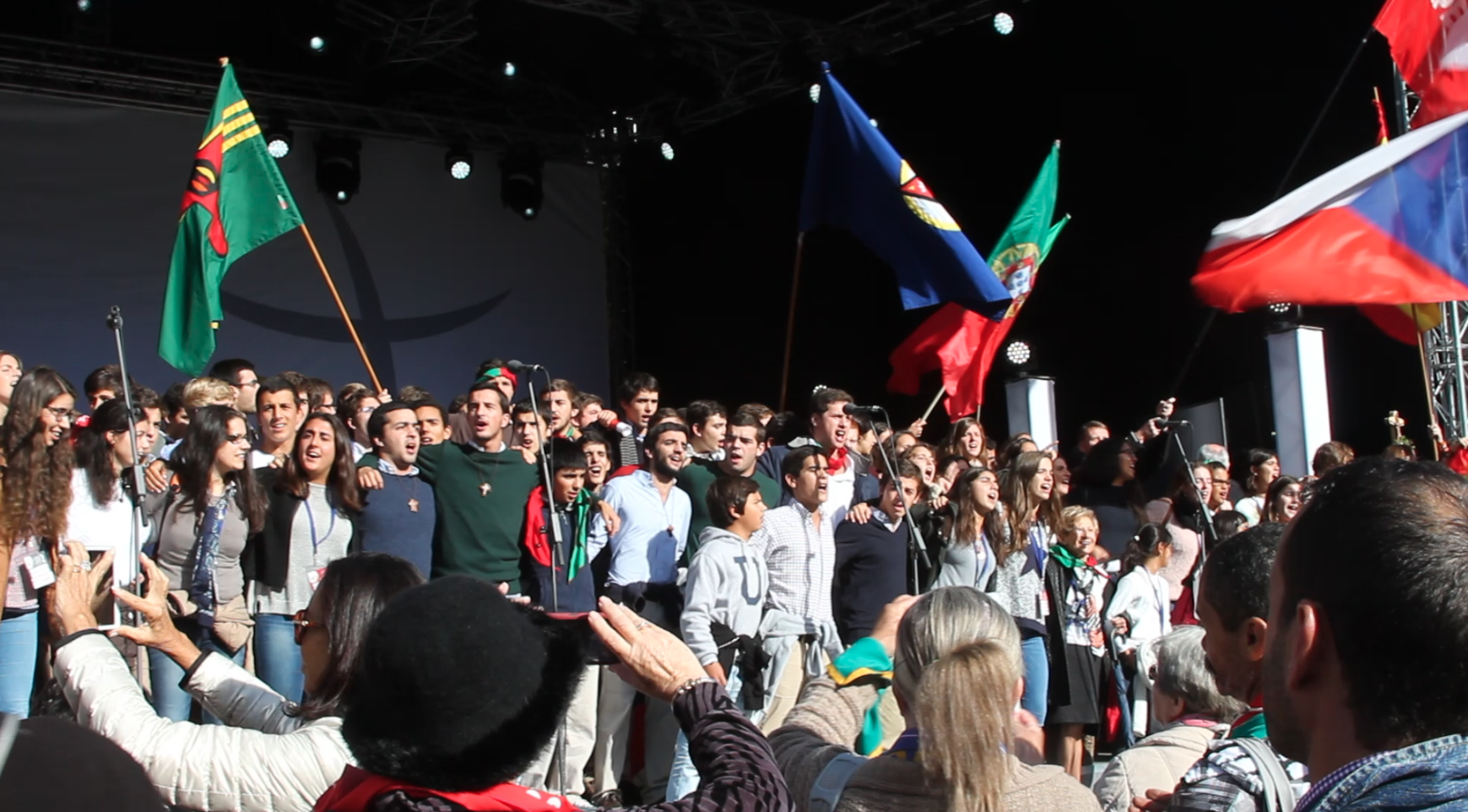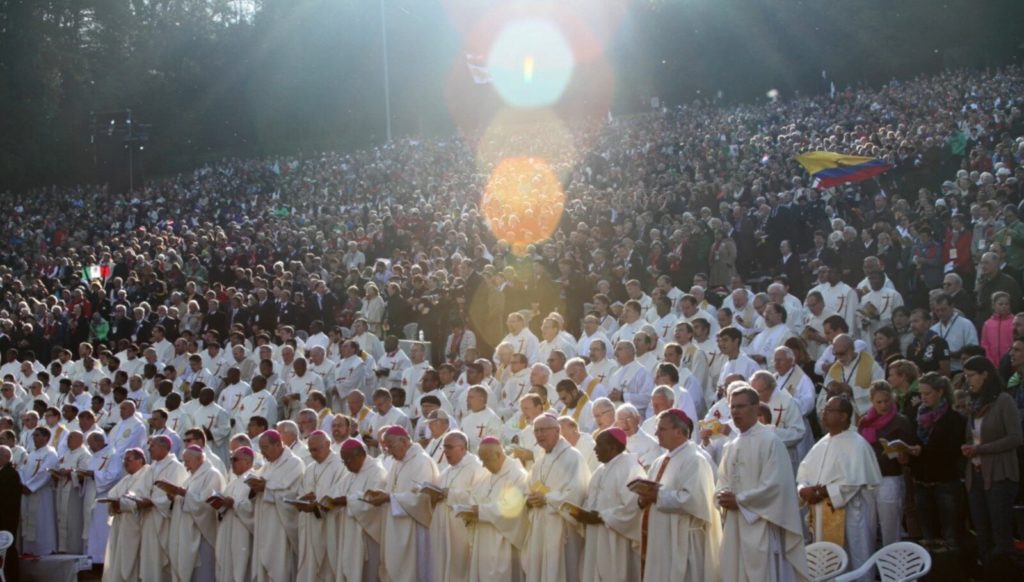Enrique Soros
What does the interwovenness of fate, of mission, and of hearts have to do with the re-founding of Schoenstatt?
Father Kentenich affirmed that Schoenstatt should be re-founded every 50 years. Such an expression is obviously not absolute. If in the same spirit we were to say that Schoenstatt should be re-founded every day, I suspect that Fr. Kentenich would say: “You get the point.”
Fr. Kentenich’s letter to the Schoenstatt Family for Christmas 1965
I set up a “broadcasting” Whatsapp group with people who might be interested in articles that I feel are relevant to Schoenstatt, to whom I send very few links. One of them was the letter written by Fr. Kentenich from Rome to the Schoenstatt Family on December 13, 1965, after all the decrees of the Holy Office against him were lifted, and before the audience with Pope Paul VI.
Garden of Mary and the Candlemas Vision
In this letter, Fr. Kentenich expresses essential, profound, intimate, transcendent thoughts. In his first paragraph he refers to the experiences of the Schoenstatt Family around Christmas 1941, when the current of the Garden of Mary emerged, through which the Schoenstatt Family raises its degree of surrender to God, asking for the liberation of the founder. This unites hearts to one another and to Fr. Kentenich. As Fr. Kentenich perceived the degree of surrender of the Family and the profound unity of hearts, he had an inner certainty that he would be freed, and on February 2, 1942, the day of the Presentation of Jesus at the Temple, also called Candlemas, he wrote the Canticle of Gratitude, which begins with the verse: “The chains have fallen!”
Although he would be released only after three years of captivity in the concentration camp of Dachau, it was later learned that in reality he was destined to be sent to the extermination camp of Mauthausen, and that in Berlin, on February 2, the decision was made to deport him to the Dachau camp. Fr. Kentenich was not released immediately, but what was transcendental for him was the inner growth of the Schoenstatt Family, in dedication and holiness and in interwovenness of fate, of mission, and of hearts. This current was called the “Candlemas vision.” Since the end of the 1940’s, the Candlemas vision also expresses the intention that Schoenstatters understand the profound Schoenstatt spirituality, and also that this understanding reaches the bishops and the Pope.
The message by Whatsapp: There is no excuse
Before I sent the message through Whatsapp, my son Martin sat next to me, and I read to him the message that I would include as a presentation of Father Kentenich’s Letter to the Schoenstatt Family. In it I expressed: “Do we live a radical interwovenness of fate, of mission, and of hearts? Only if we live it radically, will we be able to offer our original charism to the Church.” Martin and I made an examination of conscience: is there a person who we do not include in this community? We immediately looked at each other and mentioned someone whose attitudes make us very powerless. And it took us a second to conclude that this person also belongs to our interwovenness of fate, of mission, and of hearts. We cannot exclude anyone. We must all be there.

From Pompeii, Italy, they took the Covenant fire to Schoenstatt – October 2014
Actuality of the Candlemas vision
I will not delve here into the aforementioned letter, since we can read it on our own. But I will transcribe how it continues: “At the center (of the prison under the Nazis; of the exile and both liberations) is the ‘miracle of Christmas Eve’ and the ‘Candlemas vision.’ The Family is deeply imbued with the meaning of both events, so it is superfluous to make considerations about it.”
It has been 55 years since it was written. Perhaps we have been too busy with pedagogical, missionary, social, organizational, ecclesial, philosophical, theological topics, and many of us have put in the background -if we have put it at all- what Fr. Kentenich calls “in the center.”
Regarding the Whatsapp message, the responses were not long in coming, and several people shared with me that they were doing, like Martin and me, “their homework” in the face of the radical message that the interwovenness of fate demands.
A priest once said that if the Gospel of Jesus simply makes us feel good and does not make us uncomfortable, it is because his message is not reaching our hearts. If it does not take us out of our comfort zone, it is because we do not allow him to act in our lives as he would like to, to liberate us.

Schoenstatt Audience with Pope Francis
October 2014
The “four principles of Pope Francis”
Schoenstatt must be re-founded. But no! It is not a matter of calling the great pedagogues, theologians, psychologists, strategists… to carry out a perfect analysis so that others will change. The Candlemas vision was not first of all about the external, but about internal radical processes of each person, about raising the degree of surrender to the maximum, and about deepening community relationships in terms of our common destiny, mission, and unity of hearts.
It is good to have specialists in all fields, but the only thing God asks of us is radical love. Wisdom is a free gift that must be at your service. And there is no radical surrender without self-abasement and love of the cross. Pope Francis teaches us that there is no humility without humiliation. I did not know that, and it is true.
We know that Pope Francis’ charism has much in common with that of Father Kentenich. Both seek the voices of God in time, in the soul, and in the voice of being. It will not hurt to recall the “four principles” of Pope Francis, which he develops in his Apostolic Exhortation Evangelii Gaudium #222 to #237:
Time is greater than space: we must not become obsessed with seeking immediate results, which also implies not putting ourselves in the role of God, of wanting to solve everything oneself, thus anticipating or replacing God’s action. Patience achieves good results.
Unity prevails over conflict: Working in unity, conflicts are resolved faster.
Realities are more important than ideas: Work more on transforming our own reality rather than on giving theoretical solutions, which are faithful to ideas and principles, but that do not fit with the concrete reality. Those who emphasize the idea without valuing what they have, with all its defects, are usually convinced that they have the solution, which is always based on others changing.
The whole is greater than the part: understanding others, valuing others, creating a community of solidarity. For this it is necessary not to want to stand out as a “part,” but to diminish, so that Jesus and the community grow.
Authority
The subject of authority in Schoenstatt is exciting, because we are called to lead or coordinate in a democratic way, with a fraternal spirit and at the service of life. At the same time, those of us who do not exercise a directive position are called not only to support those who have this type of responsibility, but also to protect them, contributing to the spirit of community.
Today, in a rapidly changing world, we see people who feel excluded from society, and who need a sense of belonging to a group, separated from authority and often from the history and values that we have always understood as essential. They start from the feeling of victimization, not from being responsible for the change from oneself. We observe this especially in many popular demonstrations. The struggle is always external, outward, and it is demanded that others change, but normally it is not observed that the same people who demand rights live them personally. Suffice it to mention the case of those who demand tolerance to diversity – are they tolerant to those who have different opinions?
We observe this syndrome more and more often in society and it has become the implicit law of political correctness. Schoenstatt is called to illuminate these attitudes by being politically incorrect, which means to always seek the organic integration of the different social variables, which does not imply not to struggle, but requires that the first and most powerful struggle be the interior one.
From Fr. Kentenich’s vision of authority, this time we can consider analysing it from the main theme that guides this text: the interwovenness of fate, of mission, and of hearts. I do not think it is necessary to delve into the subject here. I believe that we can work on this theme in our families, our groups, and communities.
Personally, I have found Fr. Kentenich’s principles very helpful. When I see mistakes in the coordination or direction of a community, I approach the person in charge and explain my point of view. It is sacred to keep the spirit high in the community, and even to push it to grow higher. Changes can happen in the short term, in the long term, or never, but the principle that unity is above conflict is very powerful.
Two words
The ideal of the interwovenness of fate, of mission, and of hearts challenges us. And in the same way that I care for the intimacy of my blood family, I care for my larger family, Schoenstatt. Simple common sense. There will always be small and serious mistakes. Small and serious points of view will not be lacking. How to face the differences, when they are severe? There are two words that have helped me immensely to free myself in the midst of very great difficulties: “to minimize” and “to be overwhelmed.”
It is about minimizing what can be minimized. Letting a lot of things happen, because I don’t have to be the one in control of everything. Obviously we have to discuss what is necessary. As Fr. Faulhaber says: “Debate is welcome.” I think you get the point.
And I have seen whole communities that have been saved from the fall, because there were people who were overwhelmed. They let themselves be nailed to the cross and carried it bravely with Jesus. Indeed, what kind of Christians would we be if in the midst of harsh injustices we did not give Jesus the cross of self-abasement, to accompany him in his redeeming, purifying, and healing pain and loneliness?
Examination of conscience
We can ask ourselves today…
What heroic steps do I take to forge the interwovenness of fate, of mission, and of hearts?
Is there a person that I do not integrate in my heart to this community?
Do I care for, protect, value, integrate authority with sincerity of heart?
Am I able to overwhelm myself, to be “nothing”, to give myself totally, to be everything for Jesus, Mary, and the community?
Is my main strength in changing myself, or do I want to change others?

What does it mean to re-found Schoenstatt?
I believe that it is very simple, and at the same time essential, to express the meaning of “re-founding the Movement.” It is about analyzing which are the founding principles and those that kept the Movement alive, to evaluate what we should do to be faithful to these principles, and to analyze if we are applying them prophetically according to the place and time in which we live.
Only when I myself work in depth to radically live my Covenant of Love with Mary and in community with my brothers and sisters, will I be prepared to fruitfully contribute to the dialogue that leads Schoenstatt to remain faithful to its origins, giving a current and committed response to the concrete times.
It is good to keep this in mind: Any attempt to re-found without radically living the community, and to include everyone in it, and to do it in communion with the leadership, rather than re-founding, it would be founding, because it would be something different from Schoenstatt, although surely with many points in common.
Schoenstatt for the Church
If we manage to make the interwovenness of fate, of mission, and of hearts a reality, we will be prepared to offer the original Schoenstatt – prophetically updated to the time and place – to the Church and to the world.
